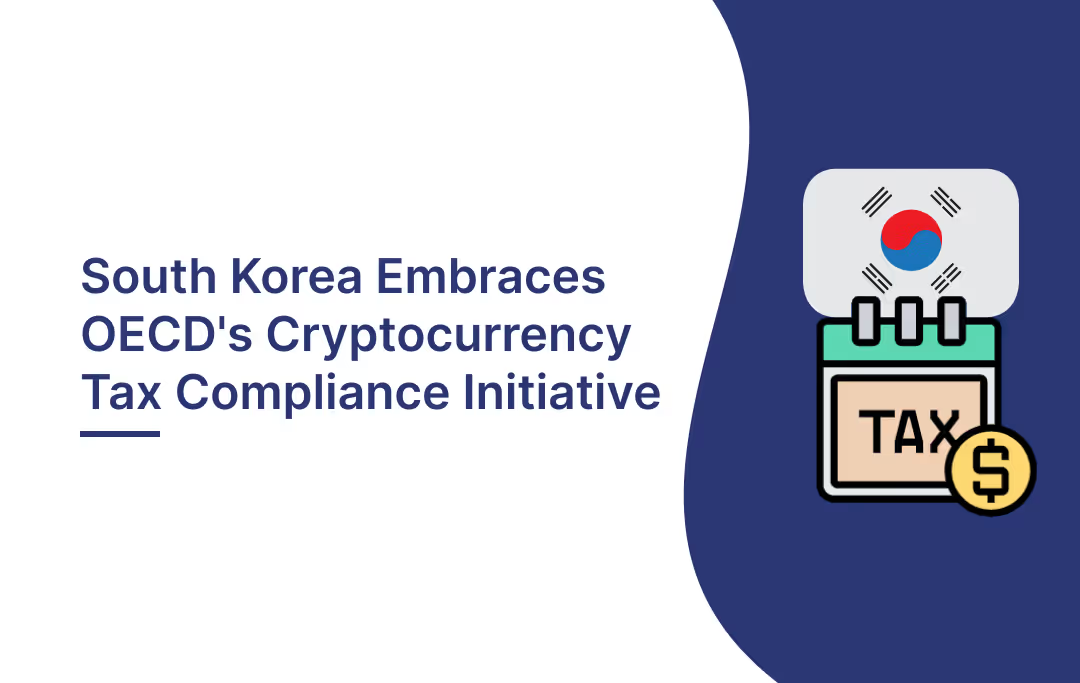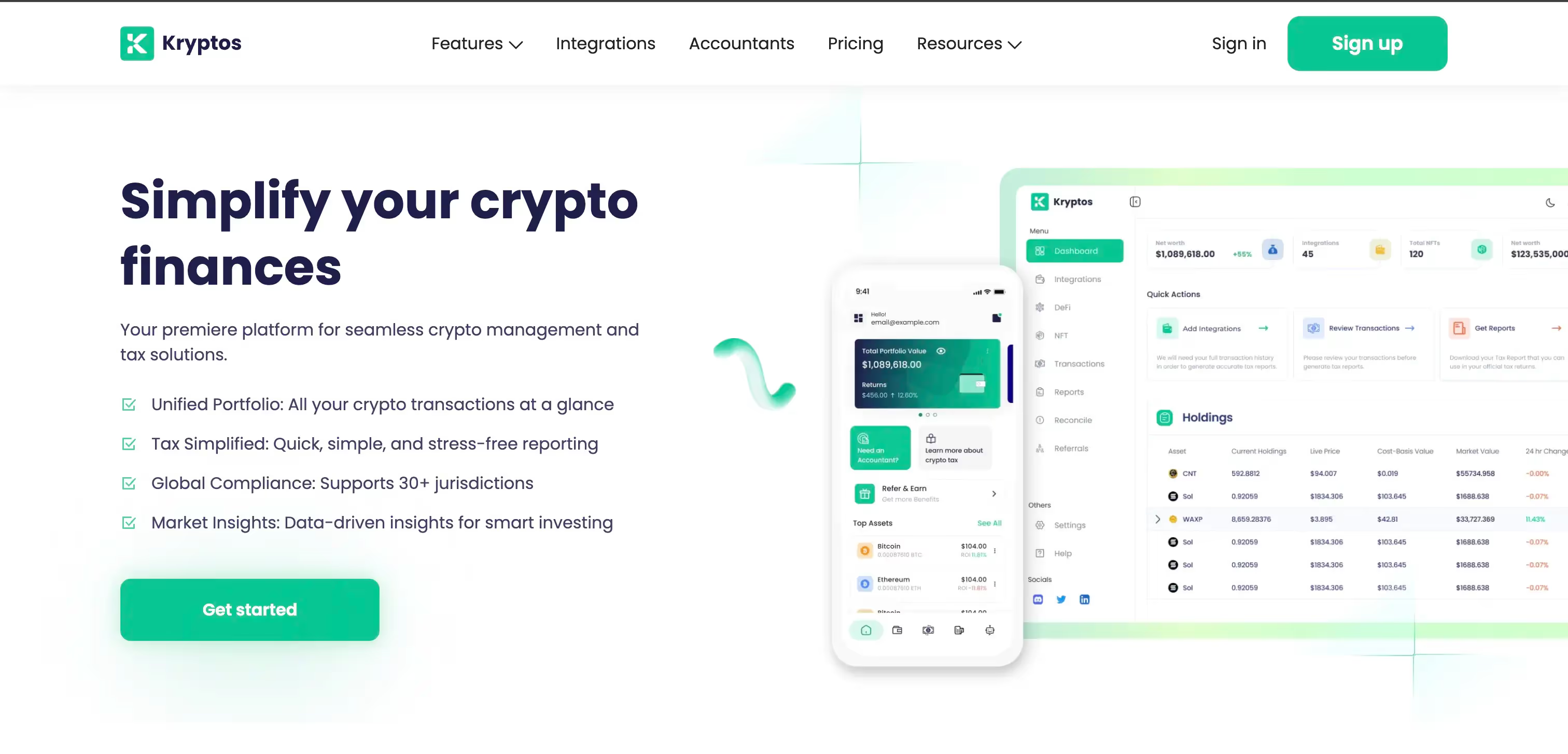.avif)
Calculate Your Crypto
Taxes in Minutes

In a significant move towards global tax transparency, South Korea has announced its participation in the OECD's Crypto-Asset Reporting Framework (CARF).
This global initiative, supported by 48 countries, is designed to ensure tax compliance and prevent tax evasion in the burgeoning cryptocurrency market.
What is the CARF?
The CARF, set for implementation by 2027, represents a concerted effort by participating nations to align their internal legal frameworks and establish necessary agreements for information exchange.
This initiative is a response to the growing need for effective regulation in the cryptocurrency domain, ensuring that tax evasion is minimized.
Read Next: South Korea Crypto Tax Guide 2024
South Korea's Proactive Role in the CARF
South Korea's commitment to this initiative is a testament to its dedication to playing a pivotal role in the global financial landscape.
The country plans to update its domestic laws and activate agreements in preparation for the 2027 timeline set by the OECD.
This move is expected to significantly aid in the widespread adoption of the CARF.
Beyond Legislation: The Need for Cooperation
Experts, during a tax administration forum in Seoul, emphasized that South Korea's successful participation in the CARF requires more than legislative changes.
It necessitates the development of a cooperative framework involving both cryptocurrency service providers and regulatory bodies. This approach is crucial for the smooth and effective implementation of the CARF in South Korea.
Wrapping Up
South Korea's involvement in the CARF marks a significant step in the global effort to bring more transparency and compliance to the cryptocurrency market.
By aligning with international standards and fostering cooperation between various stakeholders, South Korea is positioning itself as a leader in the responsible management of digital assets.
Stay on Top of Crypto Taxes with Kryptos
Crypto tax software like Kryptos takes out the stress of staying up-to-date with all the latest tax guidelines and allows you to calculate your crypto taxes accurately in just a few minutes.
Simply import your transactions from 5000+ DeFi protocols, 100+ wallets and exchanges, and supported NFTs.

The app updates all your tax liabilities in a single dashboard and allows you to save taxes while staying compliant with the latest tax laws.
Want to see how Kryptos can help simplify your crypto taxes? Sign Up Now for free.
FAQs
1. What is the Crypto-Asset Reporting Framework (CARF)?
The Crypto-Asset Reporting Framework, developed by the Organization for Economic Co-operation and Development (OECD), is an international initiative aimed at promoting tax compliance and combating tax evasion in the cryptocurrency sector. It involves collaboration among various countries to establish a standardized approach for reporting and exchanging information related to crypto-asset transactions.
2. Why is South Korea participating in the CARF?
South Korea's participation in the CARF signifies its commitment to international efforts to enhance tax transparency and prevent tax evasion in the realm of digital currencies. By joining this initiative, South Korea aims to align its domestic laws with international standards and contribute to the global effort to regulate the cryptocurrency market.
3. What is the target year for the implementation of the CARF, and what does it entail?
The target year for the implementation of the CARF is 2027. By this year, participating countries, including South Korea, plan to have aligned their domestic laws and activated agreements for the exchange of information regarding crypto-asset transactions. This alignment is crucial for the effective and uniform application of the CARF across different jurisdictions.
4. What additional steps does South Korea need to take for the effective implementation of the CARF?
Beyond legislative amendments, South Korea needs to develop a cooperative system that involves both virtual asset service providers (VASPs) and regulatory authorities. This system is essential for ensuring a smooth and effective implementation of the CARF, facilitating the exchange of relevant information, and adhering to the proposed timeline.
All content on Kryptos serves general informational purposes only. It's not intended to replace any professional advice from licensed accountants, attorneys, or certified financial and tax professionals. The information is completed to the best of our knowledge and we at Kryptos do not claim either correctness or accuracy of the same. Before taking any tax position / stance, you should always consider seeking independent legal, financial, taxation or other advice from the professionals. Kryptos is not liable for any loss caused from the use of, or by placing reliance on, the information on this website. Kryptos disclaims any responsibility for the accuracy or adequacy of any positions taken by you in your tax returns. Thank you for being part of our community, and we're excited to continue guiding you on your crypto journey!
| Step | Form | Purpose | Action |
|---|---|---|---|
| 1 | 1099-DA | Reports digital asset sales or exchanges | Use to fill out Form 8949. |
| 2 | Form 1099-MISC | Reports miscellaneous crypto income | Use to fill out Schedule 1 or C. |
| 3 | Form 8949 | Details individual transactions | List each transaction here. |
| 4 | Schedule D | Summarizes capital gains/losses | Transfer totals from Form 8949. |
| 5 | Schedule 1 | Reports miscellaneous income | Include miscellaneous income (if not self-employment). |
| 6 | Schedule C | Reports self-employment income | Include self-employment income and expenses. |
| 7 | Form W-2 | Reports wages (if paid in Bitcoin) | Include wages in total income. |
| 8 | Form 1040 | Primary tax return | Summarize all income, deductions, and tax owed. |
| Date | Event/Requirement |
|---|---|
| January 1, 2025 | Brokers begin tracking and reporting digital asset transactions. |
| February 2026 | Brokers issue Form 1099-DA for the 2025 tax year to taxpayers. |
| April 15, 2026 | Deadline for taxpayers to file their 2025 tax returns with IRS data. |
| Timeline Event | Description |
|---|---|
| Before January 1, 2025 | Taxpayers must identify wallets and accounts containing digital assets and document unused basis. |
| January 1, 2025 | Snapshot date for confirming remaining digital assets in wallets and accounts. |
| March 2025 | Brokers begin issuing Form 1099-DA, reflecting a wallet-specific basis. |
| Before Filing 2025 Tax Returns | Taxpayers must finalize their Safe Harbor Allocation to ensure compliance and avoid penalties. |
| Feature | Use Case Scenario | Technical Details |
|---|---|---|
| Automated Monitoring of Transactions | Alice uses staking on Ethereum 2.0 and yield farming on Uniswap. Kryptos automates tracking of her staking rewards and LP tokens across platforms. | Integrates with Ethereum and Uniswap APIs for real-time tracking and monitoring of transactions. |
| Comprehensive Data Collection | Bob switches between liquidity pools and staking protocols. Kryptos aggregates all transactions, including historical data. | Pulls and consolidates data from multiple sources and supports historical data imports. |
| Advanced Tax Categorization | Carol earns from staking Polkadot and yield farming on Aave. Kryptos categorizes her rewards as ordinary income and investment income. | Uses jurisdiction-specific rules to categorize rewards and guarantee compliance with local tax regulations. |
| Dynamic FMV Calculation | Dave redeems LP tokens for Ethereum and stablecoins. Kryptos calculates the fair market value (FMV) at redemption and during sales. | Updates FMV based on market data and accurately calculates capital gains for transactions. |
| Handling Complex DeFi Transactions | Eve engages in multi-step DeFi transactions. Kryptos tracks value changes and tax implications throughout these processes. | Manages multi-step transactions, including swaps and staking, for comprehensive tax reporting. |
| Real-Time Alerts and Updates | Frank receives alerts on contemporary tax regulations affecting DeFi. Kryptos keeps him updated on relevant changes in tax laws. | Observe regulatory updates and provide real-time alerts about changes in tax regulations. |
| Seamless Tax Reporting Integration | Grace files taxes using TurboTax. Kryptos integrates with TurboTax to import staking and yield farming data easily. | Direct integration with tax software like TurboTax for smooth data import and multi-jurisdictional reporting. |
| Investor Type | Impact of Crypto Tax Updates 2025 |
|---|---|
| Retail Investors | Standardized crypto reporting regulations make tax filing easier, but increased IRS visibility raises the risk of audits. |
| Traders & HFT Users | To ensure crypto tax compliance, the IRS is increasing its scrutiny and requiring precise cost-basis calculations across several exchanges. |
| Defi & Staking Participants | The regulations for reporting crypto transactions for staking rewards, lending, and governance tokens are unclear, and there is a lack of standardization for decentralized platforms. |
| NFT Creators & Buyers | Confusion over crypto capital gains tax in 2025, including the taxation of NFT flips, royalties, and transactions across several blockchains. |
| Crypto Payments & Businesses | Merchants who take Bitcoin, USDC, and other digital assets must track crypto capital gains for each transaction, which increases crypto tax compliance requirements. |
| Event | Consequences | Penalties |
|---|---|---|
| Reporting Failure | The tax authorities can mark uncontrolled revenues and further investigate. | Penalty fines, interest on unpaid taxes and potential fraud fees if they are deliberately occurring. |
| Misreporting CGT | Misreporting CGT Error reporting profits or losses can trigger the IRS audit. | 20% fine on under -ported zodiac signs, as well as tax and interest. |
| Using decentralized exchanges (DEXs) or mixers without records | The IRS can track anonymous transactions and demand documentation. | Possible tax evasion fee and significant fine. |
| Disregarding Bitcoin mining tax liabilities | Mining reward is considered taxable income, and failure of the report can be regarded as tax fraud. | Further tax obligations, punishment and potential legal steps. |
| Foreign crypto holdings: Non-disclosure | Foreign-accepted crypto FATCA may be subject to reporting rules. | Heavy fines (up to $ 10,000 per fracture) or prosecution for intentional non-transport. |
File Your Crypto Tax in Minutes








